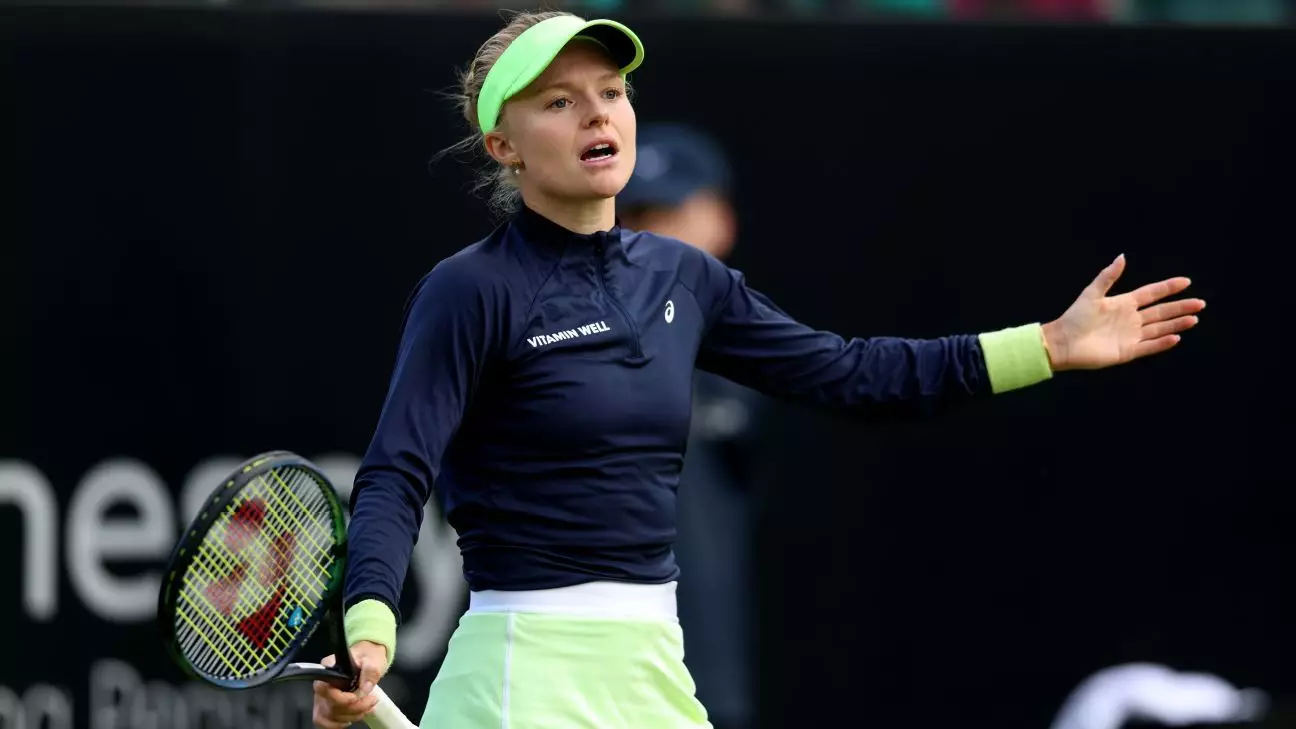Sportsmanship Under Scrutiny: Harriet Dart’s Controversial Remarks
It was a day of unexpected drama at the Rouen Open when British tennis player Harriet Dart found herself in the spotlight, not for her performance, but for a controversial comment directed at her opponent, Lois Boisson from France. The match, which ended with a decisive 6-0, 6-3 victory for Boisson, took an unexpected turn when Dart, caught in the heat of competition, asked the umpire to suggest Boisson “put on deodorant.” This offhand remark not only showcased Dart’s frustration but also ignited a flurry of criticism on social media.
As someone who loves the sport for its blend of physical prowess and mental agility, I find incidents like these both fascinating and disheartening. Sportsmanship is a cornerstone of any athletic endeavor, and moments like this remind us that even seasoned players can falter under pressure. It’s easy to forget that athletes are human too, capable of making mistakes in the spur of the moment. However, such incidents can overshadow their hard-earned skills and achievements.
This controversy surrounding Dart raises essential questions about professionalism and respect within sports. While it’s natural for competitors to feel intense emotions during matches, there’s an expectation to maintain a level of decorum. Dart’s comment was perceived as crossing a line from competitive banter into personal insult, thereby detracting from the integrity of tennis. And with the match being broadcasted widely, the impact was amplified significantly, catching the attention of millions who voiced their opinions online.
Key Takeaways
- Harriet Dart’s comment sparked significant social media backlash.
- Professionalism and respect are crucial aspects of competitive sports.
- Apologies in sports hinge on perceived sincerity and timing.
Instant Backlash and Public Apology
The swift backlash prompted Harriet Dart to take immediate action. She turned to social media to issue an apology, asserting that her comment was made “in the heat of the moment” and did not reflect her true character or values. In her statement, she acknowledged Boisson’s skill and expressed regret for letting her frustrations manifest as an inappropriate remark. This response highlights the immense pressure athletes face in maintaining a positive public image in today’s digital age.
However, apologies are only effective if they seem genuine. While Dart’s admission seemed sincere, it brings up an important question: Can athletes truly separate their competitive nature from their responsibilities as role models? Her comment exposes a deeper issue within sports culture—the delicate balance between competitiveness and maintaining professional dignity. The incident serves as a reminder of how easily frustrations can spill over into unsportsmanlike behavior.

Responses and Social Commentary
Lois Boisson’s response to the situation was nothing short of gracious. She took to social media herself, sharing an edited photo where she humorously referenced Dove deodorant alongside her celebrating on the court. This clever retort turned what could have been a damaging incident into an opportunity for positive dialogue around body positivity and personal care. By handling the situation with humor and grace, Boisson set an example for how athletes can rise above negativity.
Boisson’s reaction resonated with fans who praised her ability to transform criticism into something constructive. Her approach encouraged a culture of positivity rather than hostility within sports. By shifting focus back to enjoying the game instead of dwelling on personal slights, Boisson challenged others to handle criticism with similar poise. Her actions remind us all that humor can be a powerful tool in defusing tension and promoting camaraderie.
A Lesson on Sportsmanship
This entire episode serves as a potent reminder of the responsibilities held by athletes beyond just competing on the court. For Harriet Dart, this experience could become a pivotal learning opportunity—one that underscores the importance of maintaining composure and respect regardless of external pressures to win. As public figures scrutinized by fans worldwide, athletes are judged not only for their skills but also for their character off the field.
Dart’s comments may have been a lapse in judgment, but they open up meaningful dialogue about expectations within professional sports. Accountability and honorable conduct cannot be overstated; they are fundamental principles that guide athletes in their careers. This incident could serve as a catalyst for broader conversations about how competitors navigate their instincts while upholding sportsmanship values—an area ripe for reflection and growth across all sporting disciplines.

Final Thoughts
The controversy involving Harriet Dart at the Rouen Open is more than just an isolated incident; it’s a reflection of broader themes within competitive sports today. It reminds us that while athletic prowess is celebrated, character and integrity are equally vital components of an athlete’s legacy. As spectators and fans, we must recognize that athletes are human too—they make mistakes but also have opportunities to learn from them.
The lessons learned here extend beyond tennis courts or any particular sport—they touch upon universal values such as respectfulness under pressure and accountability towards one another as fellow humans competing toward common goals. As we continue witnessing high-stakes matches unfold worldwide involving our favorite players like Harriet Dart or Lois Boisson let us remember these moments serve not only entertainment purposes but also educational ones fostering better understanding among diverse audiences globally through shared experiences rooted deeply within humanity itself!
sportsmanship
tennis controversy
Harriet Dart
Lois Boisson


Leave a Reply